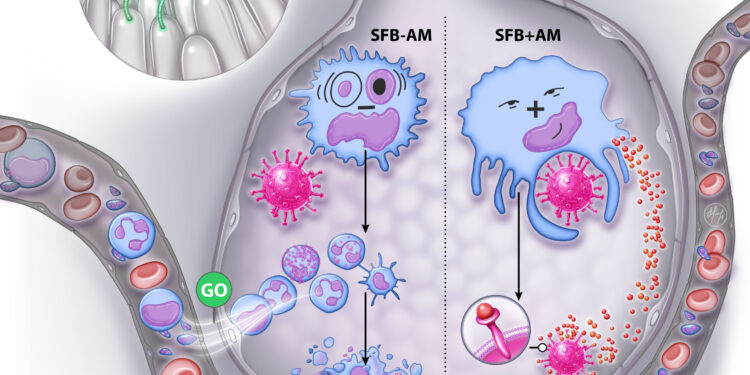This image illustrates an example of gut microbiota composition dictating how resident pulmonary alveolar macrophages (AMs) respond to viral infection. The presence of segmented filamentous bacteria, a commensal microbe found in some mice, reprograms AM gene expression, thereby increasing complement expression and phagocytosis, thereby allowing AM to engulf and destroy viral pathogens without inflammatory signaling. Credit: Dr. Andrew Gewirtz
The composition of the microbiota present in the gut influences the susceptibility of mice to respiratory viral infections and the severity of these infections, according to researchers at the Antiviral Translational Research Center at the Institute of Biomedical Sciences at Georgia State University .
The results, published in the journal Cellular host and microbereport that segmented filamentous bacteria, a bacterial species found in the intestines, protected mice against influenza virus infection when these bacteria were either naturally acquired or administered.
This protection against infection also applied to respiratory syncytial virus (RSV) and severe acute respiratory syndrome coronavirus 2 (SARS-CoV-2), the virus that causes COVID-19. To maintain this protection, the study noted that the segmented filamentous bacteria needed immune cells in the lungs called basally resident alveolar macrophages.
In this study, researchers investigated how and how differences between specific microbial species can impact the outcomes of respiratory viral infections, which has not been well defined before. They studied mice with discrete differences in the microbiome and mice differing only in the presence or absence of segmented filamentous bacteria. Viral titers in the lungs were measured several days after infection and varied significantly depending on the nature of the microbiome of different groups of animals.
“These findings reveal complex interactions that mechanistically link the gut microbiota to the functionality of basally resident alveolar macrophages and the severity of respiratory virus infection,” said Dr. Andrew Gewirtz, co-senior author of the study. and Regents Professor at the Institute for Biomedical. Science at Georgia State.
The study found that in segmented filamentous bacteria-negative mice, basally resident alveolar macrophages were rapidly depleted as respiratory virus infection progressed. However, in mice colonized with segmented filamentous bacteria, basal resident alveolar macrophages were modified to resist exhaustion from influenza virus infection and inflammatory signaling.
Basally resident alveolar macrophages deactivated the influenza virus, largely by activating a component of the immune system called the complement system.
“We find it remarkable that the presence of a single common commensal bacterial species, among the thousands of different microbial species that inhabit the mouse gut, had such significant impacts on patterns of infection by respiratory viruses and “These impacts are largely attributable to the reprogramming of basal resident alveolar macrophages,” said Dr. Richard Plemper, co-senior author of the study, Regents Professor and director of the Center for Translational Antiviral Research at Georgia State. .
“If applicable to human infections, these results will have major implications for future assessment of a patient’s risk of progression to severe disease.”
“We find it very unlikely that segmented filamentous bacteria are the only gut microbe capable of impacting alveolar macrophage phenotype and, therefore, predisposition to respiratory viral infections,” Gewirtz said.
“Rather, we hypothesize that gut microbiota composition largely influences predisposition to respiratory viral infections. Microbiota-mediated programming of basally resident alveolar macrophages may not only influence the severity of acute respiratory viral infection, but may also be a long-term post-respiratory viral infection. determinant of health.”
The study’s lead authors were virologist Carolin M. Lieber of the Antiviral Translational Research Center and immunologist Vu L. Ngo of the Georgia State Institute of Biomedical Sciences. Other contributing authors were Hae-ji Kang and Michal Kuczma of the Georgia State Institute of Biomedical Sciences and Kaori Sakamoto of the University of Georgia.
More information:
The programming of the intestinal microbiota of alveolar macrophages influences the severity of respiratory viral infection, Cellular host and microbe (2024). DOI: 10.1016/j.chom.2024.01.002. www.cell.com/cell-host-microbe… 1931-3128(24)00006-4
Provided by Georgia State University
Quote: Study reveals that the intestinal microbiota influences the severity of respiratory viral infections (January 30, 2024) retrieved January 30, 2024 from
This document is subject to copyright. Except for fair use for private study or research purposes, no part may be reproduced without written permission. The content is provided for information only.



